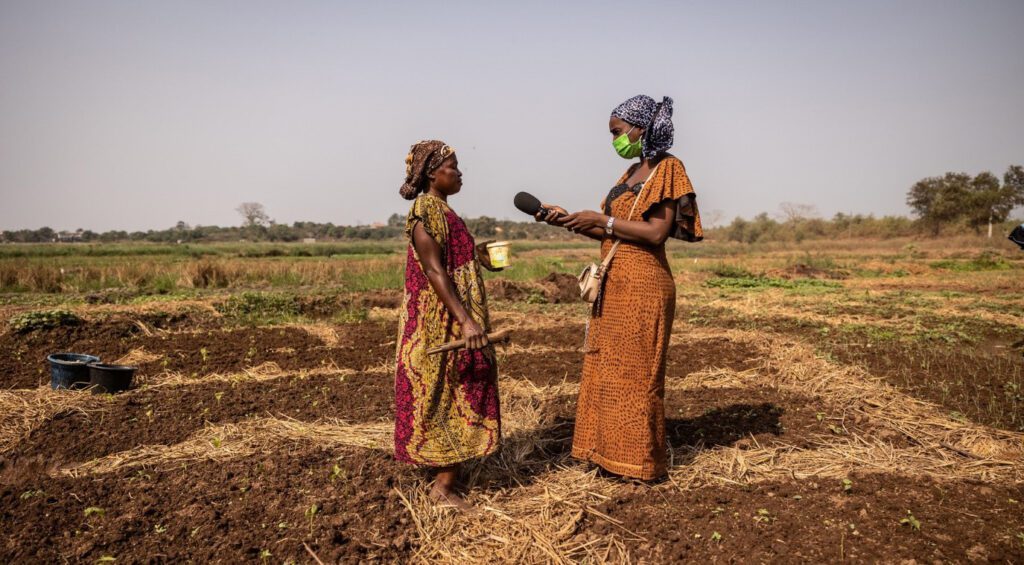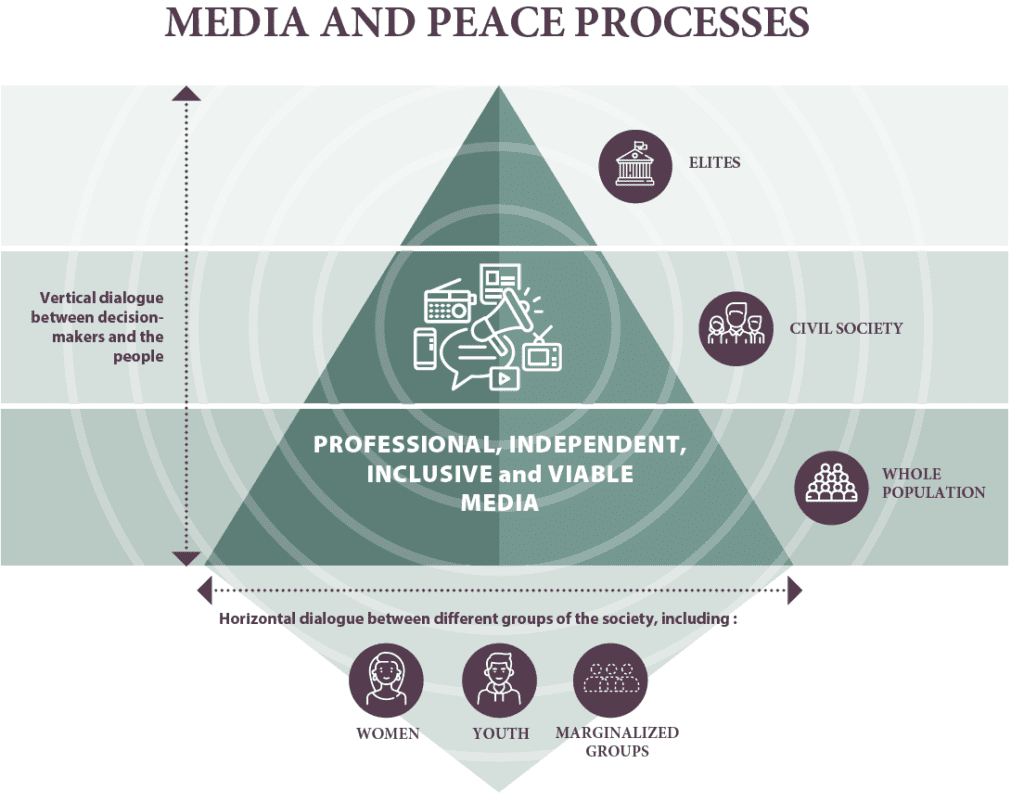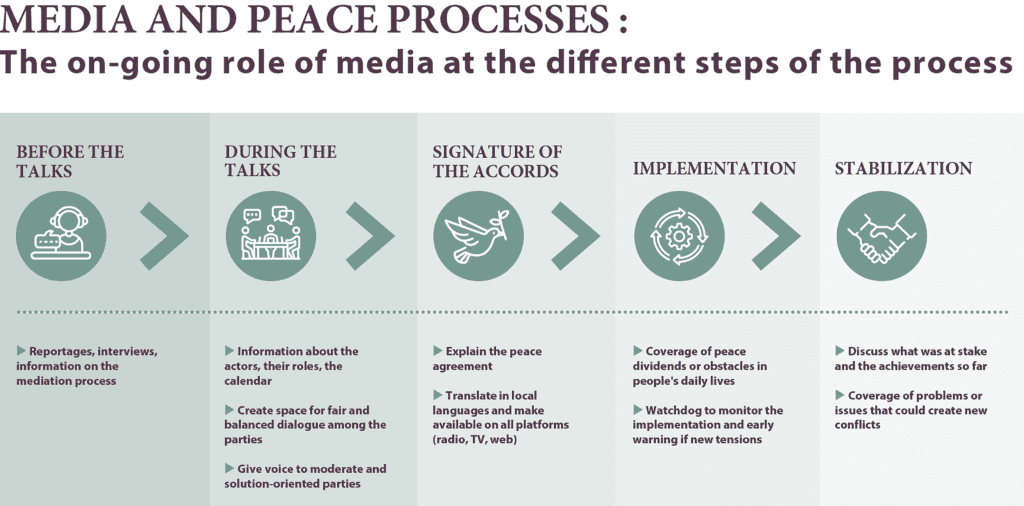
Strategic communications, or the targeted use of communication, often bears little fruit in conflict situations. Cookie-cutter, one-way messages that create no space for dialogue leave populations trapped in the role of passive victims. Listening, understanding, and dialogue are key to resolving any conflict – and professional, independent, and inclusive media outlets can provide the safe spaces for exchange needed to facilitate peacemaking. This makes fostering a robust, highly pluralistic media landscape with a diverse array of national and regional outlets a priority in countries where conflict resolution and peacebuilding processes are taking place.
Media coverage of mediation processes encourages more transparent dialog between all stakeholders, keeps the population informed about ongoing peacebuilding initiatives and ensures that citizens’ needs and expectations are heard by those in power. What’s more, programs can be formatted to inspire populations to openly exchange ideas and work together on creating solutions to resolve conflict. Experience shows that these “ground up” approaches to peacebuilding often result in a more robust and long-lasting peace.

To succeed in bringing together a polarized society around a shared, unifying reconciliation project, those involved have to both understand the project’s complexity and at least tacitly agree on its desired outcomes. National and regional media often have the best understanding of the realities of the process at hand: Having closely followed the negotiations from the outset, they are familiar with the issues, local populations’ expectations, timelines and mistakes involved. These outlets broadcast in local languages and, for the most part, also reach outlying regions usually overlooked by international media. This type of grassroots broadcasting can be a significant asset in certain conflicts, particularly when opposing views are promoted to a greater degree, or overrepresented, in the capital. In Niger, for example, the majority of the most outspoken voices during the coup d’etat of July 2023 emanated from outside Niamey. By giving a voice to marginalized groups, Studio Kalangou, the Niger-based media outlet owned by Fondation Hirondelle, has been able to provide a counterbalance to many statements.
Independent and (sometimes) critical news media is vital to reconciliation
High-quality, independent, accessible, and – sometimes – critical news reports are crucial in enabling citizens to understand the issues at hand and participate in the reconciliation process. However, in certain peacebuilding contexts, the independence of media outlets covering the peace process is undermined by these organizations’ fragile structure, weak editorial position, and ties (real or purported) to one of the parties involved in the conflict. These media outlets then have a stake in the conflict in question, and muddy the waters by spreading rumors and unduly criticizing mediation efforts. But disinformation isn’t just the product of coordinated, concerted, controlled or top-down efforts on the part of a few interested parties: It’s also amplified by rumors, particularly when they fill an information gap.
Stemming the flow of disinformation online in this digital age has become an extremely time-consuming and laborious task. Many media development (MediaDev) organizations now combine “debunking” initiatives with strengthening local news media to build trust between these outlets and their audiences. In October 2023, rumors that rebel forces were preparing to enter Bangui, the capital of the Central African Republic, spread panic through the population and led to the deaths of several people attempting to flee the city. After repeated unsuccessful appeals for calm by local authorities, Radio Ndeke Luka dedicated an episode of ‘Patara’, the station’s flagship political debate show, to discussing the events. Bringing different stakeholders together around the same table in this way restored citizens’ confidence and facilitated a return to calm.

Peace processes and the media: a partnership forged ahead of time
To ensure that the coverage of conflict resolution initiatives is both reliable and useful, journalists need to be trained in the issues surrounding the mediation and peace processes at an early stage and given easy access to information about the ongoing negotiation processes. The organizations participating in negotiation processes should likewise have completed media relations training, and must work in advance to identify which professional national and regional media networks adhere to ethical standards. The Journalism Trust Initiative (JTI), for example, is an international mechanism that rewards ethical journalistic practices, and can help stakeholders in mediation processes identify local media outlets to work with.
Fondation Hirondelle is currently working to support media outlets in countries affected by ongoing conflicts, such as Myanmar and Ukraine, where the peace process has grind to a halt. In both of these countries, the Fondation is actively helping to support and ensure the survival of independent, high-quality media, provide displaced populations with the news and information they need and report on justice-related issues in connection with these conflicts. Protecting media independence and fostering pluralism in the media landscape despite the conflict are vital to encouraging audiences to feel close to media outlets and to trust in them to report on future peace processes.